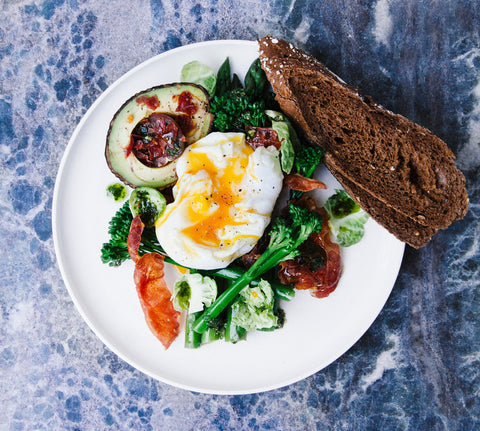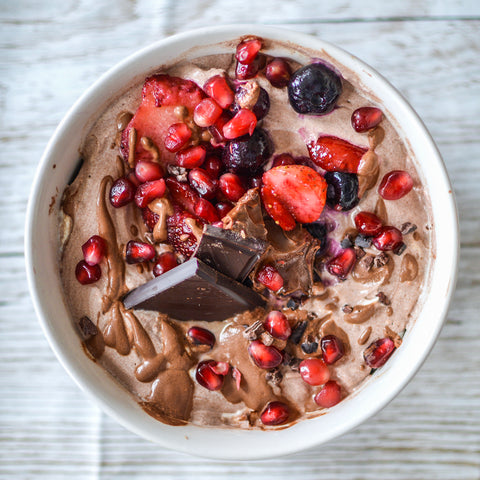Our Guide To Macros
When you’ve got goals to hit, we understand that not everyone likes to rely on guesswork, they want facts and figures. Which is why many people who use our products also count their macros. For those unsure of the fitness lingo, 'macros' is short for macronutrients, which describes the key nutrients the body requires primarily for energy. Counting your macros is essentially just tracking how many of each macronutrient (proteins, carbs & fats), you’re consuming, to make sure you’re getting the right balance to achieve your specific goals.
To kick things off, here’s a run through of the key macronutrients and why they are so important…

Protein
Of course, we’re going to start with our favourite macronutrient – protein! Protein is made from amino acids, which are quite literally the building blocks of our bodies. Amino acids make cells, enzymes, our immune system and lots more, and without protein, we don’t grow, function or heal… so it’s kind of a big deal!
As Dr Nick states in this detailed blog post about the role of protein, “the basic building blocks of proteins are amino acids. There are twenty-two amino acids that the body uses, nine of which cannot be made by the body and are thus termed essential amino acids. These must be taken in from our diets. Three of these essential amino acids include the Branched Chain Amino Acids (BCAA) leucine, isoleucine and valine, which are great for protein synthesis”.
If you're looking to supplement your protein intake, Whey protein is great for offering you a full amino acid profile, as is our Vegan Protein – thanks to its bespoke blend of hemp and pea.
Carbs
Although carbohydrates often get a bad rap, they are crucial for providing our bodies with energy, which is exactly why we often crave high-carb foods when we're feeling tired! There are two groups of carbohydrates – simple and complex – and complex carbohydrates take longer for the body to break down, giving a slower release of energy. Fruits, vegetables, oats, potatoes and whole grains are all awesome sources of wholegrain carbohydrates and are what we recommend fills the vast majority of your intake.
Simple carbohydrates, however, can be utilised after a workout to replenish the body, as the sugars break down much quicker.
To read more on carbohydrates, check out this blogpost, here.
Fats
Simply put, eating enough fats is absolutely crucial for a well-functioning body and when consumed as part of a well-balanced diet, will not make you fat! It assists in so many vital bodily functions, such as hormone regulation, brain function, vitamin absorption and so much more.
They contain more calories per gram (9 calories to be precise), but they are often much more satiating and will give you a slow release of energy throughout the day… as if we needed an excuse to include more avocados and peanut butter in our daily diets!
To find out more on fats, check out this blogpost, here.
Why People May Track Macros

Most of the time, tracking macros is a decision based around aesthetic goals. If you're aiming for weight loss or gain, this could simply be done by simply counting calories or just mindfully eating more/less than your usual intake or being more/less active, to make sure you’re in either a calorie deficit or surplus. However, by ignoring macronutrients the quality of your weight loss could suffer.
For example, if you don’t have a high enough protein intake during a calorie deficit, this can cause you to lose muscle when a reduction in body fat is actually the aim. The more muscle you have, the more energy you burn – so it’s crucial to maintain as much of this as possible whilst dieting. If your carbohydrate levels are too low, this could impact your performance in the gym and could leave you feeling permanently fatigued.
Some people may also count macros for small periods of time to improve their overall health, for example, if they struggle to eat enough of a particular macronutrient. If you’re struggling to recover from workouts and eat a relatively low carbohydrate diet by choice, it might be good to track your intake for a while to see if you’re getting enough of what you need to support your training. To do this, there are plenty of apps available, the most common being My Fitness Pal, and to work out your macros, you can enter your details into this tool, here.
It is also important to mention, that this approach may not be for everyone and it’s important to do what works best for both your body and mind. For some, tracking macros is an easy way of reaching a particular goal whilst still enjoying a few of their favourite treats. For others, this intense focus on everything they’re eating can quickly become obsessive or make them feel restricted around food (resulting in disordered eating patterns or binges). Remember, do what is best for you!
Macro-Friendly Recipes
We’re here to help support your healthy lifestyle however you may choose to approach your nutrition, which is why we always provide a macronutrient breakdown for all of our recipes on our website. We have recipes for every occasion or craving, but here are a couple of great options for those looking for macro-friendly alternatives that will still satisfy their sweet tooth:
Chocolate Greek Yogurt Protein Bowl

This greek yogurt bowl tastes amazing and really couldn't be simpler to make. Simply combine 3 ingredients together in a bowl and add your favourite toppings for a seriously high-protein chocolate pudding...
Nutritionals per serving: Calories = 322; P = 60g, C = 19g, F = 3g)
This delicious, supercharged protein coffee is perfect for a pre-workout energy boost, or to settle a rumbling stomach mid-morning - and it tastes like a creamy, coconut mocha!
Nutritionals per serving: Calories = 181; P = 17g, C = 9g, F = 8g)

It’s the ultimate dilemma; you’ve really been craving a slice of gooey chocolate cake but you want neither to spend 2 hours baking one nor stray too far from your nutritional goals. Never fear, this chocolatey dessert is the perfect solution. Made in a mug in the microwave, this high protein cake with a melting chocolate centre will help you hit your protein goals and save you from slaving away in the kitchen - that’s what we call a win, win situation! Swap the banana for applesauce if you'd like a slightly lower carbohydrate content.
Nutritionals per serving: Calories = 348 ; P = 34.3g, C = 38.4, F = 8.1g)
On-The-Go Takeout Options
When it comes to tracking macros, being prepared is key. However, we’re so lucky that there are now so many healthier options available when eating on the go. In London, places like Crussh, Hiit Kitchen, Tossed and Pret offer great healthy snack pots will all the ingredients and macros fully listed – just to make life a little easier! Otherwise, you can pick up some awesome high-protein snacks from your local supermarket such as Biltong, Greek yogurt, edamame beans or even boiled eggs and spinach pots.
Want to go one step further? Make some protein balls at home and pack them with you or if you’re in the Regent St. area, stop for a protein shake at the Neat Café!

